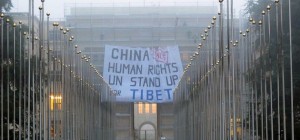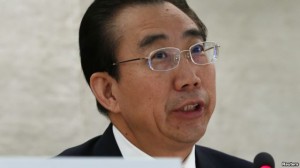
Tibetan activists scaled the building and unfurled a banner reading: “China fails human rights in Tibet – UN stand up for Tibet” in Geneva.
Photo: Students for a Free Tibet
China’s human rights record has come under scrutiny this month at the United National Human Rights Council’s four-yearly review of all UN members. The Council’s Universal Periodic Review (UPR) Working Group met in Geneva, and on October 21 formally reviewed the human rights situation in China for the first time since Xi Jinping became president in March.
Hours before the session began, five Tibetan activists scaled the building and unfurled a banner reading: “China fails human rights in Tibet – UN stand up for Tibet”. UN security detained the activists, who were from Denmark and Britain. A spokeswoman for Students for a Free Tibet (SFT) later said they had not been charged and were expected to return home.
“Entire towns and villages in Tibet are under military lockdown. Today, in Geneva, China is finally in the hot seat” said Padma Dolma, Campaigns Director of SFT. Pema Yoko, also from SFT, said “The human rights crisis in Tibet demands action by the international community and must be front and centre during today’s review”.
At the review Western countries accused China of arresting activists, curbing internet use and suppressing ethnic minorities and their religions, including Tibetans and Muslim Uighurs in the western Xinjiang region. China has responded to unrest by intensifying a crackdown by security forces, and Xi Jinping has showed no sign of easing harsh policies.

Wu Hailong, special envoy of China’s foreign ministry, addressing the Human Rights Council at the UN in Geneva on October 22.
Photo: Reuters
China’s special envoy Wu Hailong, who led Beijing’s delegation in Geneva, said some of the accusations levelled at China had been “based on misunderstandings and prejudices” and said that minority ethnic groups in China were treated fairly.
“I think that there wasn’t really an openness to criticism,” Sharon Hom, executive director of Human Rights in China, told a news briefing. And prominent rights lawyer Mo Shaoping told Reuters “Xi Jinping has definitely taken the country backwards on human rights”.
The UPR provides the opportunity for each State to declare what actions they have taken to improve the human rights situations in their countries and to fulfil their human rights obligations.




 Print
Print Email
Email